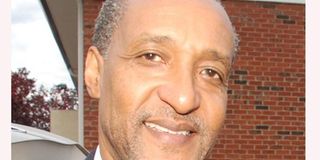United Nations team crafts new goals for 2030

Kenya’s Permanent Representative to the UN, Macharia Kamau, at a past event. PHOTO | FILE
A United Nations team charged with crafting new global targets to succeed the expiring Millennium Development Goals (MDGs) has suggested 17 new objectives to be achieved by 2030.
The team, known as the Open Working Group (OWG) and co-chaired by Kenya and Hungary, last week tabled the new objectives, just two weeks after a UN report indicated most African countries will not achieve eight MDGs by the 2015 deadline.
These proposed goals will now await a formal vote by member states of the UN during the upcoming General Assembly in New York in September.
A vote in favour by a simple majority will mean the goals will be adopted to replace the MDGs, launched in 2000.
The eight MDGs were: to eradicate extreme poverty and hunger, achieve universal primary education, promote gender equality and empower women, reduce child mortality, improve maternal health, combat HIV/Aids, malaria and other diseases, ensure environmental sustainability and develop a global partnership for development.
Kenya’s Permanent Representative to the UN, Macharia Kamau, said the new goals differ from MDGs in that they have been created after deep discussions by UN members rather than a mere prescription by the UN system for developing countries.
SPECIFIC TARGETS
“In other words, the goals are the product of an all-inclusive intergovernmental consultative process,” Mr Kamau said on Friday.
“Thus, they present all the 193 countries with a historic opportunity to pursue an internationally agreed set of sustainable development goals for a transformative sustainable development agenda.”
The goals are a breakdown of the MDGs in that issues on poverty eradication, the environment and health have been split into several areas of focus in what appears to correct a weakness long identified in the MDGs.
There are 169 specific targets within the 17 goals and their deadline year will coincide with that of Kenya’s Vision 2030 when Kenya will hope to have become a middle income country.
“The shadow of social instability caused by growing inequalities has arrived,” says Mr Irungu Houghton, a senior advisor at the Society for International Development.
“Reducing inequalities will be central to the new Sustainable Development Goals.”
Economists, though, warn that we may still miss out on those goals unless Kenya learns from the weaknesses seen in implementing MDGs.
SKILLED WORKFORCE
“Kenya’s strongest focus should be to build a skilled human resource and financing environment. The country must urgently re-orient its population to that of solution givers or problem solvers, the innovators,” Mr James Shikwati, the Director of Inter-Region Economic Network (IREN) told the Nation.
He added: “Kenya need not worry so much about achieving Millennium Develop Goals; rather it should worry on how far it is to the decision and agenda setting arena in the global economic systems. The agenda seat is a preserve of countries that churn out value to the world and not to those that simply consume value from others.”
According to Dr Paul Gachanja, an economist at Kenyatta University, the MDGs were too condensed, making their application difficult.
“The MDGs were too crowded, we had goals yes, but breaking them down for implementation was an issue. How do you, for example, implement environmental conservation? It is too broad; we needed action points.
“The lesson we can draw from MDGs is that we lacked priorities, because when we plan for something, it must be accompanied with proper funding. We need to mobilise our peoples because ignorance is a big issue. People need to buy into these targets. Workshops cannot help anybody in Kenya,” Dr Gachanja says.
BIGGEST CHALLENGES
A report published earlier this month showed that countries in Sub-Saharan Africa are unlikely to meet their 2015 target date for the implementation of some of the MDGs.
It cited rising poverty and hunger, conflict and population growth as the biggest challenges to achieving some MDGs before the 2015 target.
These SDGs include an analysis of issues affecting the world in three pillars: economic, social and environmental, and also a goal on “peaceful and inclusive societies”.
They have retained certain MDGs thought to have been unfinished, such as combating disease, nurturing global interaction.
However, industrialisation, technology sharing and financing the means of achieving those targets have been included.
The OWG arose from a decision made during the Rio+20 Conference in Brazil during which member states agreed to launch a programme to develop a set of Sustainable Development Goals (SDGs) to build on the MDGs.
Some of the proposed new goals are to end poverty in all forms everywhere, to end hunger, achieve food security and improve nutrition and promote sustainable Agriculture and to ensure healthy lives and promote well-being for all ages.





